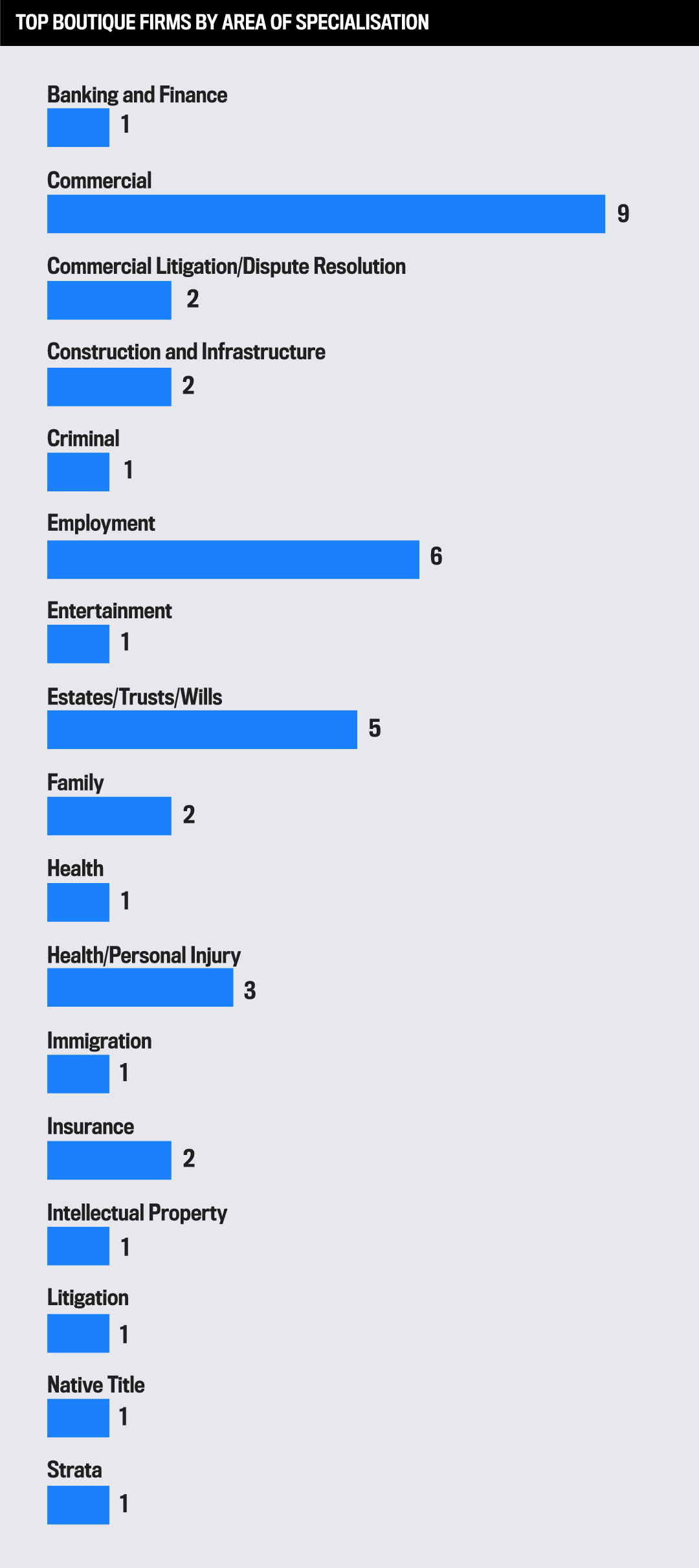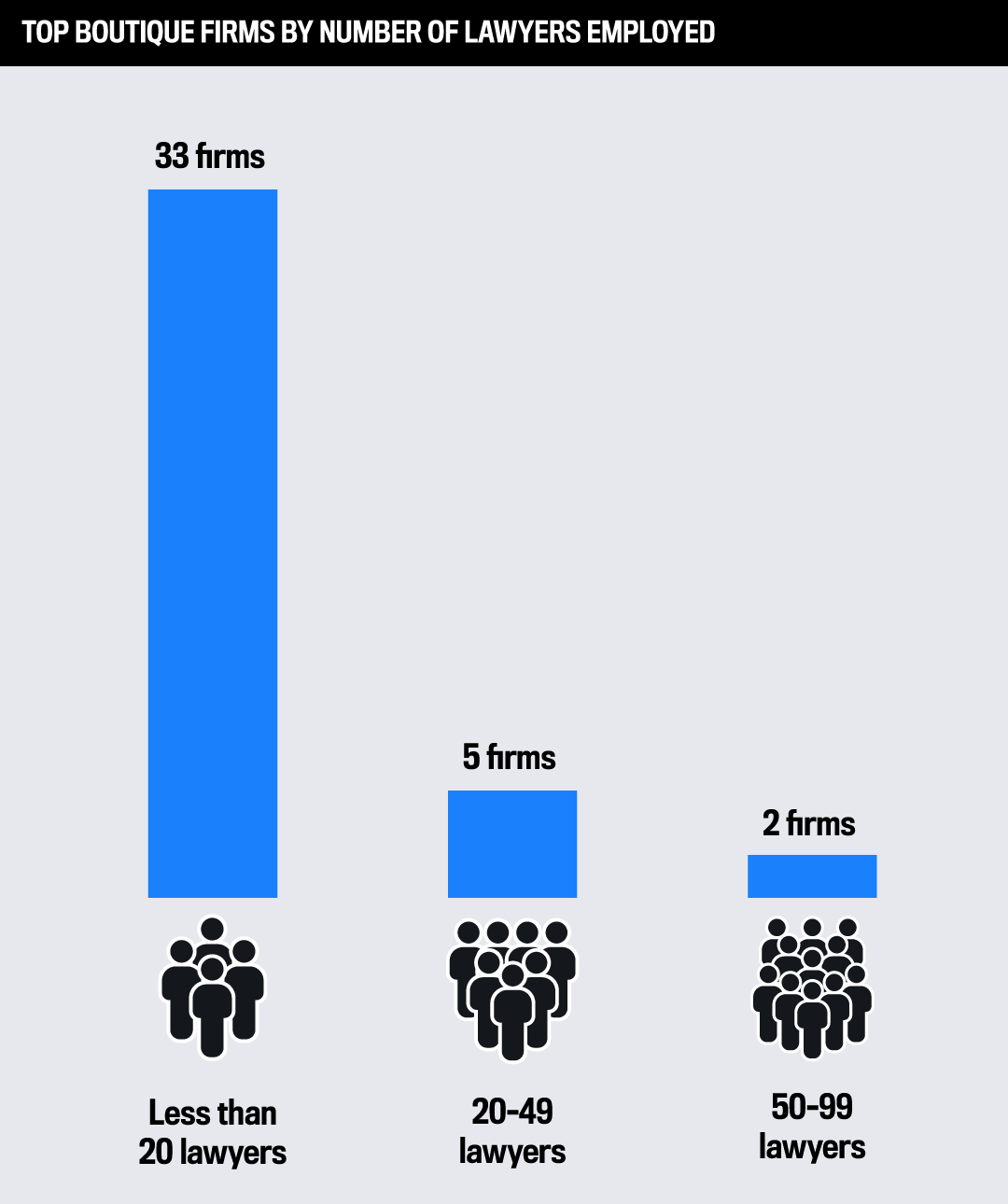

Jump to winners | Jump to methodology
Boutique law firms have flourished as the pandemic helped to uncover areas their lawyers could focus on specifically, such as employment law, offering tailored legal advice at reasonable costs. They have also learned to innovate and further refine their practices to meet their clients’ needs.
Instead of reacting to the latest developments, law firms are finding their footing and taking charge once more. That was to be expected as the industry had undergone tremendous growth. By 2020, there were 83,643 lawyers nationwide, a 49% increase since 2011.
Lawyers bound by traditional working hours and protocols have been granted a greater degree of control over their schedules. Firms have accepted that operations are proceeding smoothly outside of the office.
“Boutique firms are becoming increasingly more common and many, including ours, are holding their own against the large top-tier firms when tendering for work in both the private and public sectors,” says Lisa Aitken, managing director of Top Boutique Firm Aitken Legal.
“I believe this will continue to increase with clients choosing to go with a boutique firm due to the quality of legal advice provided.”
“Boutique firms are holding their own against the large top-tier firms when tendering for work in both the private and public sectors”
Lisa Aitken, Aitken Legal

The pandemic has allowed boutique firms to expand beyond their physical locations.
“It really does not matter anymore where a client and their lawyer are located – they can be in different states, and people now accept this and are very open to having meetings via Teams,” Aitken says.
She highlights the importance of maintaining strong client relationships in the face of increasing digitalisation – something that impacted Aitken Legal’s launch of a Melbourne branch last year.
“We opened a Melbourne office in January 2021 following our legal director’s decision to move to Melbourne to be closer to family. What made this decision very easy was knowing Queensland clients would have no difficulty continuing to work with him remotely,” Aitken explains.
Nonetheless, Advantage Legal principal solicitor Leigh Davidson points out that law firms are still a “customer-facing business”.
“We think that the key to making this work is to provide the team with two-way flexibility. What that means is that if our team would like to work from home or in the office, they are permitted to do so; however, if our client needs to see them in the office or they are required to attend court, they understand that they’re required to do so,” he says.
Firms have been more willing to permit hybrid working arrangements where staff can partially work from home given that productivity was maintained – and often even improved – throughout lockdown.
“We’ve seen most businesses relax into a hybrid working model that’s become the new normal, which we couldn’t have envisaged before the pandemic. Importantly, that has increased access for people of all abilities to be able to join the workforce in a way they couldn’t before,” says Danny King Legal principal Danny King.
“The sharing of knowledge, building of relationships and collaboration to achieve better client outcomes has always been a strength of boutique firms”
Danny King, Danny King Legal
Lawyers are relishing the return of working closely with their peers at an increasing rate.
“Encouragingly, collaboration across the legal community has returned, and we expect that to gather pace,” King says. “The sharing of knowledge, building of relationships and collaboration to achieve better client outcomes has always been a strength of boutique firms and we think that will pick up across the sector.”
She explains that product development has become a focal point for her firm in the last year.
“We’re constantly looking to be more innovative and develop our service offering for our employer clientele, so they can be more proactive with their employment governance,” King adds.
The firm’s initiatives have not stopped at serving clients, but also extend to bettering relationships amongst staff.
“As we were able to move to a hybrid working model early on, we’re now looking at ways to increase comradery across the firm. And that’s included a self-appointed social committee to organise events throughout the year to bring people back together more regularly,” King shares.
While many boutique firms thrived and evolved during the pandemic, the tumultuous economic environment remains a concern.
“While we’ve been able to quickly adapt to the changing needs of clients and staff during the pandemic, the uncertainty around economic conditions is likely to be front of mind for many firms as cost pressures increase,” King explains.
Aitken admits that boutique firms also have lower overheads than their larger rivals, enabling them to offer more competitive fees and a “more tailored personalised service”.
Part of collaborating closely with clients is educating them on more efficient ways to use technology.
“One of the biggest challenges we faced pre-pandemic was to explain the benefits of technology to other members of the legal and insurance industries. [These] industries had a tendency to resist technology as it disrupted the way ‘things had always been done’,” Davidson says.
“Without a doubt, one of the silver linings of the pandemic is that it has forced entire industries to become more familiar with technology. It enables quicker and more accessible interactions between law firms, insurance companies and medical providers, which in turn has a flow-on effect to our clients, their rehabilitation and their compensation cases.”
“We’d expect to see employees move within the legal industry to find working conditions that better suit their personal needs”
Leigh Davidson, Advantage Legal

Aitken Legal and its clients are taking the initiative, even in the face of global and domestic tensions. For example, July 2022 saw Australia’s inflation rate reach 6.1%, its highest in over two decades.
“Our clients are starting to be proactive again with making sure employment contracts are current, reviewing policies and employee entitlements, etc. During COVID-19, our clients were always on the backfoot and in a world that was new to us all, but it was a very complex world for employers for the best part of two years,” Aitken says.
The challenge now for the firm is attracting seasoned legal talent to bolster its ranks, particularly with its area of specialisation, employment law, rising in prominence.
“As a regional firm, it tends to be difficult to recruit talented lawyers and where we are looking for a senior associate or above, we will only employ true specialists in our area of law,” Aitken explains. “This has become increasingly more difficult since COVID-19 as employment lawyers have been in high demand.” This surge is evident across Australia’s entire legal market with some firms raising salaries by 10% and 15% to keep their talent.
Moreover, Davidson does anticipate there will never be total acceptance of hybrid working.
“It is our belief that a hybrid flexible working environment is the future of the legal profession. Although most employers were forced to allow such a model to some degree during the pandemic, it is unlikely that the whole of the legal profession will adopt a hybrid flexible working model permanently,” he says.
“Ultimately, we’d expect to see employees move within the legal industry to find working conditions that better suit their personal needs.”
From 25 April to 20 May, Australasian Lawyer accepted nominations for the Top Boutique Firms 2022 list. The team was on the lookout for firms that derived at least 50% of their revenue from one practice area. Firms were invited to nominate candidates via an online entry form. Entrants were asked to name their area of specialisation, describe their achievements over the past 12 months, and explain why they stood apart from their competitors.
The nominations were evaluated based on the strength of the matters handled by the firms, their longevity in the profession, their client service delivery approach, and noteworthy achievements in meeting clients’ needs.
At the end of the review process, 40 firms emerged as the cream of the crop and earned the right to be recognised as the Top Boutique Firms in Australia this year.
83% of the winning firms employ less than 20 lawyers
23% of the top firms practice commercial law
18 winning firms are based in NSW